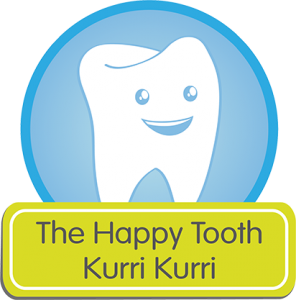
KIDS TEETH
When do baby teeth erupt?
The first tooth usually comes through at six months of age in the lower front area. Teething can sometimes start earlier at three months of age or as late as twelve months of age.
When and how should I start cleaning my baby’s teeth?
You should introduce cleaning your baby’s teeth as soon as you can. This way they will be used to sensation before the first tooth arrives.
You can use a wet cloth or a small toothbrush that fits on your finger to wipe your baby’s gums before bedtime. It is very important to clean your child’s teeth before they go to bed as like adults, most of the damage to teeth occurs while you are asleep.
Children should only use a small amount of age appropriate toothpaste, making sure they spit out the excess and do not not swallow it- try to encourage no rinsing, this allows the fluoride in the toothpaste to work to its full potential.
Once children become more independent with toothbrushing, increase to brushing twice daily.
It is advised for an adult to assist in brushing of a night. This is because most children lack the hand skills to brush properly until around 8-9 years old.
Putting infants to bed with a bottle of milk or juice can increase the risk of developing tooth decay. The sugars and acids in the liquids will accelerate the demineralisation of the teeth. Rinsing with tap water or brushing after a bottle can help reduce the risk.
What age should my child have their first visit?
The earlier the better! If you have an appointment for yourself, feel free to bring your baby with you so they become used to the sights, sounds and goings on. Otherwise, at least by the age of two. Visits from a young age helps the child feel more relaxed, making it easier if they need any dental work performed in future
However, if your child is younger and has a cavity or has had an accident, they should come immediately.
How do I prepare them for their first dental visit?
Generally, the first visit is stress free! Most dentists will try to make it a fun adventure, taking a ride in the dental chair, counting their teeth, and check their smile. They may even polish them to make their teeth ‘shiny’.
Try not to pass on any anxiety or fear about how you feel at the dentist. Dentistry has come a long way and is a lot more stress free nowadays.
Why are baby teeth so important?
Deciduous (baby) teeth are important because they help children eat, speak, and develop the skills needed for proper oral hygiene. They also reserve the space for permanent teeth, guiding them into the correct position as they emerge.
If deciduous teeth are lost too early, it can affect jaw growth and the eruption of the adult teeth.
Therefore, taking care of baby teeth is the key to ensuring a healthy adult smile.
